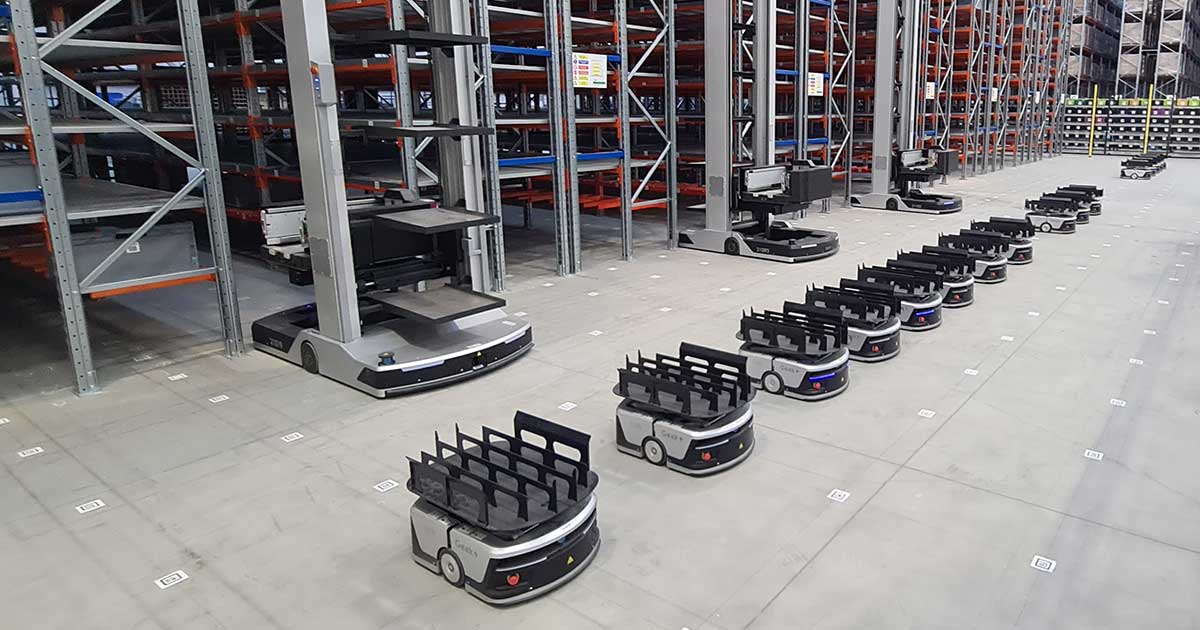2023 Global Warehousing & Logistics Survey
Discover insights from the 2023 Global Warehousing & Logistics Survey, highlighting trends, challenges, and innovations in supply chain management for industry professionals.
Open File
15.03.2024
Welcome to the world of seamless warehouse operations, where the introduction of Warehouse Management Systems (WMS) have revolutionised the way inventory is managed, tracked, and distributed.
At the heart of modern logistics, a WMS is more than just software – it’s an essential tool empowering businesses to meet the dynamic demands of supply chain excellence. In this article, we’ll explore how the warehouse management system has become an indispensable player in contemporary warehouse management, and uncover the myriad of features and benefits it brings to the table!
From its origins as a simple means to control inventory, to the sophisticated, interconnected platforms of today, warehouse management technology has undergone a substantial evolution. From its origins as a simple means to control inventory, to the sophisticated, interconnected platforms of today, warehouse management technology has undergone a substantial evolution. According to Fortune Business Insights “The global warehouse management system market size was valued at $2.75 billion in 2022. The market is projected to grow to $7.30 billion by 2030…”.
Let’s delve into how warehouse management systems have become the backbone of state-of-the-art warehousing strategies, enabling businesses to scale new heights in efficiency and customer satisfaction: Join us as we unravel the capabilities that make a WMS the linchpin of optimal warehouse operations, and the incredible advantages it offers to businesses keen to stay ahead of the curve.
Unlock the full potential of your warehouse operations – let’s take a look into the core features that characterise cutting-edge Warehouse Management Systems; designed to optimise efficiency and streamline processes, these features are the powerhouse behind successful warehouse management: Achieve optimal warehouse processes and supply chain operations through the implementation of warehouse management software!
WMS will help you experience unparalleled control over your inventory with centralised inventory management. This cornerstone of the systems allows for a consolidated view of stock levels at multiple locations, no matter where your inventory resides – whether on-site or across multiple warehouse locations.
Error reduction is another significant advantage provided by the WMS system. In this system, error-prone manual processes are streamlined, leading to more reliable data. The accuracy of WMS in inventory control allows for a precise match between the physical stock in the warehouse and the inventory records, minimising stock discrepancies that can lead to costly inventory adjustments.
Obtain a crystal-clear snapshot of your warehouse operations with real-time data tracking and visibility – this critical feature ensures that every item is accounted for, from inbound shipments to precise location tracking within the whole warehouse operation.
Future-proof your warehouse operations with
Future-proof your warehouse operations with seamless integration capabilities; a robust WMS seamlessly connects with your existing ERP systems, e-commerce platforms, and supply chain technologies, creating a cohesive ecosystem that drives efficiency and growth.
Streamlined labour management processes are the backbone of a productive warehouse workforce and happy, motivated employees! A sophisticated WMS allocates tasks based on worker availability and performance, reducing redundancy and optimising the use of human resources.
Revolutionise the way your warehouse or distribution centre handles goods with advanced shipping and receiving functionalities. A WMS equips businesses with the tools to expedite the movement of goods, accurately process orders, and improve overall customer satisfaction.
Embracing technology in warehouse operations can often feel like navigating uncharted territories. However, the implementation of a proven Warehouse Management System (WMS) brings forth a multitude of benefits that can revolutionise the way a warehouse operates. Let’s delve into the key advantages of integrating a WMS into your logistical workflow.
The journey towards a tech-savvy warehouse is marked by significant gains: With a WMS, efficiency isn’t just a buzzword—it’s a tangible outcome that positions your business for growth and customer satisfaction. The initial steps towards adopting a WMS may seem daunting, but as the benefits show, the resulting performance boost is well worth the effort.
Meeting the challenges of an ever-evolving market requires a warehouse management system that not only stands the test of time, but grows with your business. Ensuring scalability and flexibility within your warehouse operations is pivotal to staying ahead in a competitive landscape.
Here’s how a robust WMS can help you adapt and expand effectively.
Business expansion is a sign of success, but it can also bring about logistic complexities.
A scalable WMS is your answer to seamless growth. By facilitating easy integration of new technologies, additional storage space, and an increasing volume of transactions, scalability ensures that your warehouse can accommodate growth without costly downtime or a drop in customer satisfaction.
In today’s dynamic business environment, flexibility is just as critical as scalability; a WMS equipped with flexibility allows for the fast adaptation of warehouse operations to changing marketplace demands and business processes.
This adaptability is essential for:
Embracing a WMS with both scalability and flexibility can future-proof your warehouse operations, ensuring you’re well-equipped to handle whatever comes your way, from seasonal spikes to unexpected global trends.
Selecting the optimal Warehouse Management System for your business is a critical decision that influences overall efficiency, productivity, and your bottom line, making it vital in navigating through potential roadblocks, and carefully weighing various factors in order to make an informed decision, suited to your unique operational needs.
Before embarking on the journey to integrate a WMS, you need to be aware of any potential challenges that could arise. These could include anything from resistance to change from staff, the need for substantial training, data migration complexities, to unforeseen costs. Additionally, the integration with existing systems can be intricate, requiring a meticulous strategy to minimise disruption to logistics processes and in tracking inventory.
Every business has unique requirements and it’s crucial to align these with the features and capabilities of a WMS.
Make sure to consider the following questions in order to align your warehouse management system with your business requirements, goals and any problems commonly faced:
Addressing these factors diligently will help ensure you select a WMS that is not only functional but also offers a strategic advantage in the highly competitive world of warehousing and logistics, and will be able to grow and adapt alongside your business operations and changing requirements.
As we hurtle into a digital tomorrow, warehouse management systems continue to evolve and adapt. Innovations in technology and changes in consumer behaviour are shaping a new horizon for logistics and supply chain practices.
Here, we delve into the emerging trends poised to redefine the efficiency, agility, and intelligence of warehouse operations.
The integration of cutting-edge technologies promises to bring unprecedented levels of productivity and insight to warehouse management systems:

The rise of these technologies calls for businesses to reassess and align their operational strategies with the future landscape:
Agility will also be crucial; warehouse operators must be ready to pivot and implement new solutions as soon as they arise, to stay competitive in a rapidly evolving market.
As businesses prepare to capitalise on these advancements in integrated wms capabilities, they position themselves for not just growth, but sustained leadership in the increasingly complex and demanding world of warehouse management.
SEC Group’s Warehouse Management Systems (WMS) have revolutionised the way supply chains operate, bringing unparalleled efficiency and competitiveness to those who adopt the technology.
As we’ve explored through the features and benefits of WMS, it is clear that a modern and robust working management system is no longer a luxury, but a necessity in the fast-paced world of logistics and supply chain management.
Implementing a standalone warehouse management solution allows for real-time inventory control yard management, advanced data tracking, enterprise resource planning, effective labour and dock management, seamless integration with other systems, and much more. These core features provided by SEC Group ensure a solid foundation for companies looking to optimise every aspect of their warehouse operations and, in turn, their entire supply chain:
The scalability and flexibility of the WMS systems make them suitable for businesses of all sizes, enabling growth and rapid adjustment to market demands. In the context of ROI, the benefits significantly outweigh the initial investment, with many businesses reporting a quick recovery of costs through the efficiencies gained.
As e-commerce continues to grow, a robust WMS becomes indispensable for staying competitive in this global marketplace; from the small retailer to the large multinational corporation, the effectiveness and responsiveness of the supply chain are defining factors in success.
To conclude, the impact of warehouse management systems on supply chain efficiency cannot be overstated. They serve as the pivotal element that can transform the productivity, accuracy, and profitability of warehouse operations in an ever-evolving industry landscape – adopting a WMS is a strategic move that positions a business for future growth, resilience, and ongoing success.
FeedBack From Christie Lites :
“Having worked with SEC Storage on our previous warehouse installation, we knew that they offered something different to other partners. But we have been overwhelmed by the lengths they have gone to, designing and delivering a totally bespoke solution to an otherwise unsolvable issue. The other options out there were just not fit for purpose, and everyone told us we couldn’t do what was required. But not SEC Storage. Their team of experts together with the manufacturer have been incredible to develop this solution and we will be reaping the rewards for years to come.” – Robin Wain, Director, Christie Lites
In the quest to maintain a competitive edge, companies must look forward to integrating advanced WMS solutions, thereby solidifying their place as leaders in the dynamic environment of supply chain management. Now is the time to embrace the innovation that WMS brings and to leverage its full potential for a truly streamlined and efficient supply chain, with help from SEC Storage, expert WMS vendors who want to help you optimise your warehouse operational efficiency. Contact us today!


Discover insights from the 2023 Global Warehousing & Logistics Survey, highlighting trends, challenges, and innovations in supply chain management for industry professionals.
Open FileRobotics-as-a-service (RAAS) solves two problems facing many businesses today.
Read MoreWorkplace design and flexible spaces have become more crucial than ever in catering to the evolving work styles and needs of employees.
Read More